- Home
- Joel C. Rosenberg
The Copper Scroll Page 2
The Copper Scroll Read online
Page 2
* * *
The train began to slow.
Marcus Santini stepped to the door. His right hand moved to the sidearm holstered under his overcoat. His left hand reached for his badge.
A voice came over the loudspeakers, announcing their location. The doors opened. Santini waited a moment, then looked out. Only a handful of passengers stepped off the train and onto the platform. The man with the backpack wasn’t among them.
Santini drew his weapon and, keeping it low and at his side, moved quickly to the next car. He ducked his head in but saw no one he recognized. He did the same for the next car, but again, Backpack wasn’t there.
His doubts were rising again. Was this guy even on the Metro? There was only one train he could have gotten on, and this was it. But what if he had headed into Union Station instead, toward the shops or the movie theaters or perhaps the Amtrak trains? Which was worse: chasing a ghost or losing one?
Santini was about to call the whole thing off when he suddenly spotted Backpack. He was standing in the next car, nearly hidden by a group of giggling teenage girls. Santini’s heart began racing again. If he was going to move, it had to be now. But was he really going to pull his weapon on this guy on a crowded D.C. subway car?
He still had no idea who the man was. He had no proof he was actually a threat. The backpack could be filled with schoolbooks or gym clothes or a ham sandwich and a six-pack of Coke, for all he knew.
Santini remembered an incident in London, shortly after the bombings there, when police had mistakenly shot and killed an innocent, unarmed man, thinking he was another suicide bomber. And yet, for all his doubts, Santini knew he had to move now, even at the risk of embarrassing himself and the bureau.
The chimes sounded again. The train doors began to close. Angry with himself for hesitating too long, Santini stuffed his sidearm into his coat pocket and quickly slipped into the train car behind Backpack’s—just in time. The train began to move again.
Santini took a seat behind a large African-American woman carrying an armful of shopping bags, then noticed that the phone in his pocket was vibrating. He pulled it out and found that the e-mail had arrived. Actually, eight had arrived, the master file having been too large to send all at once. He scrolled through the photos as quickly as he could.
“Come on, come on,” he whispered under his breath.
There were too many faces, and none of them matched.
He glanced up at Backpack. But with so many people around him, Santini couldn’t get a better look at his face. He would have to go by memory. His phone chirped again. His battery was almost dead.
He scrolled through another set of photos, then glanced back at his watch. He had less than two minutes until they reached the next station. More e-mails. More photos. Santini’s pulse was racing. Sweat was dripping down his back.
And then his heart stopped. That was him. That was Backpack.
Santini saved the image, then speed-dialed the FBI Operations Center.
“This is Special Agent Marcus Santini,” he whispered, his voice quaking slightly as he gave his authorization code. “I’m on the Metro. Red Line. Heading west. I have a positive ID on one Alonzo Cabresi. High-priority target. Suicide profile. Bulletin says consider armed and extremely dangerous. Requesting backup at—”
But Santini’s phone died before he could give his location.
* * *
“What did he just say?”
For a moment, the watch commander in the FBI Op Center couldn’t believe what she’d just heard and made her colleague who had fielded the call repeat himself, just to be sure. A priority-one target in D.C.? On a Metro train, no less?
It wasn’t possible. They’d had no warnings. No chatter. Nothing that would indicate an attack, imminent or otherwise. Just the opposite. After all that had happened in Russia, Iran, and the Middle East recently, the world had gone quiet. The last three months had been the quietest of her entire ten-year career.
“Trace the call,” she ordered.
“I’m doing it now, ma’am.”
“Let’s go, let’s go.”
“I’m going as fast as I can, ma’am.”
“How much longer?”
“At least another minute or two.”
“We might not have that long.”
She grabbed the red phone on the console in front of her and speed-dialed the Secret Service command post.
“Sir, this is Agent Andrews at the FBI Op Center. We are going to threat level delta. Secure POTUS and crash the White House.”
* * *
“Next stop Metro Center. Please watch your step.”
Santini raced through his options. But there weren’t any. He was out of time. He would have to do this alone, he realized, and his hands began to tremble. At least he still had the element of surprise.
Then Santini looked up and saw Cabresi staring back at him from the adjoining train car. The man had a look of both shock and horror on his face. He’d been made, and he knew it. His hand moved to the backpack.
Instinctively, Santini drew his weapon. Cabresi ducked behind the teenage girls and moved to the exit. The doors opened. Cabresi made a mad dash for the escalators.
Santini moved to the door, but the woman in front of him did as well. He almost knocked her over trying to get out and in the process lost his footing and precious seconds. By the time he got back on his feet and onto the platform, Cabresi was nearly to the top of the stairs. Santini raised his sidearm and shouted, “Stop, FBI.”
But it was too late. Cabresi had disappeared.
* * *
He answered on the first ring.
“Secretary James?”
“Speaking.”
“Sir, this is the FBI Op Center. You have an urgent call from Director Harris.”
“Put him through.”
Homeland Security Secretary Lee James was headed to Baltimore to give a speech to a conference of mayors when the FBI director gave him the news. Now he ordered his protective detail to turn around and get him back to Washington as quickly as possible. His driver instantly slammed on the brakes and spun the heavily armored Chevy Suburban into a lane of oncoming traffic, followed by the rest of their security convoy.
“Where’s your man now?” James asked.
“We lost contact,” said Harris. “But his last signal put him near Metro Center.”
James froze. That was just a block from the White House. It wasn’t possible. Not with all the safeguards they’d put in place. And what if Cabresi wasn’t alone? What if this was a coordinated attack? Worse, what if Cabresi wasn’t simply carrying conventional explosives, but a dirty bomb or a suitcase nuke? Even a small nuclear device detonated in the heart of Washington could kill fifty thousand people almost instantly. It could leave another quarter of a million dead within the next few days and weeks.
“Scott, tell me the president has already left for Camp David.”
“I’m afraid not,” said Harris. “Not until three. He’s giving a speech right now.”
“Where?” James pressed.
“The JW Marriott.”
James’ stomach tightened. The terrorist was heading right for the president.
* * *
“Get him out, now.”
That was all U.S. Secret Service Agent Jackie Sanchez heard in her earpiece. She didn’t hear why. She didn’t take time to ask. She simply moved like she’d been trained, like she had practiced a thousand times before.
President James “Mac” MacPherson was addressing the National Association of Manufacturers when Sanchez and two fellow agents grabbed him by his arms and jacket and escorted him quickly offstage. They were immediately surrounded by another dozen agents who created a security cordon around the president, while still other agents blocked the auditorium’s exits and calmly ordered the confused audience members to sit down and stay put.
* * *
The next sound Santini heard was a gunshot—and then screams.
He bounded u
p the escalator steps two at a time, weaving his way through a small crowd of terrified Japanese tourists as he did. Breathless, he finally reached the top, only to find Cabresi in the street—gun drawn—forcing a mother and her two young children out of a green Dodge Caravan.
The mother was hysterical. She was trying to get her youngest out of a car seat, but the child’s leg was stuck. Cabresi now shoved the gun in the woman’s face and yelled at her to move faster.
Santini raced for the cover of a mail truck parked along the street and carefully moved himself into position. He raised his gun again and aimed for Cabresi’s head. He wanted to take the shot but he couldn’t. Not without the risk of hitting the mother or her kids.
The child’s leg was now free, and Cabresi forced the woman and the kids to lie on the sidewalk, facedown. Santini feared he was about to kill them all, execution style.
He moved to the other side of the mail truck, inched his way forward, and calculated the distance to the minivan. It wasn’t more than twenty-five or thirty yards. If he sprinted, he could be there in a matter of seconds. There was still the risk that Cabresi would kill the family. But he might kill them anyway, and many more.
* * *
“Let’s go, let’s go, let’s go.”
Agent Sanchez and her team raced the president down a labyrinth of hallways, through the kitchen, out the service entrance, and down the loading dock. There Sanchez shoved him into the back of his armor-plated limousine, slammed the doors shut, and ordered the motorcade back to the White House.
* * *
Santini heard sirens in the distance.
They were coming from every direction. Cabresi heard them too. Panicked, he climbed inside the open driver’s-side door and started the engine.
It was now or never.
As Cabresi peeled away—heading west down Pennsylvania Avenue—Santini bolted from the safety of the mail truck. He aimed his weapon and fired. He fired every round he had. The back windows of the Caravan exploded. The vehicle almost veered out of control, smashing through a trash can and a fire hydrant before turning a corner and vanishing from Santini’s sight.
* * *
“And if you actually find this scroll?” the book agent asked.
Murray could see Catrell’s eyes dancing with anticipation and he leaned in closer, oblivious to all the sirens and commotion just down the street.
“It will be the greatest archeological discovery of the twenty-first century,” he whispered. “Which is why I wanted to meet with you before I left. You’re actually the only—”
But Murray never finished his sentence.
A green Dodge Caravan suddenly jumped the curb and smashed into the front of the Willard. An instant later, a massive explosion ripped through the lobby. A ball of fire engulfed the famed hotel. Thick black clouds of smoke billowed high into the afternoon sky. Twisted metal and shards of glass were flying everywhere. The ceiling began to collapse.
When it was over, authorities would find George Murray and Gene Catrell among the dead and have no idea why.
2
SATURDAY, JANUARY 10 – 12:58 p.m. – WINCHESTER, VIRGINIA
Jon Bennett’s heart raced.
He’d been dreaming and planning and praying for this day for six months. He had considered every detail, spared no expense. But now that it was finally here, he couldn’t shake the butterflies in his stomach.
He wasn’t scared—just jittery, unsettled. His friends had warned him this was no time to get married or have children. Perhaps they were right. But Bennett couldn’t help himself. Even if this day was his last, he wanted to spend it married to the woman he loved. And who knew for sure? Maybe they had more time than they thought.
He shifted from foot to foot in the back hallway of the small church near Winchester that they had been attending for the past several months and checked his watch. The music would be starting any moment.
Peeling back the edge of a curtain, Bennett looked out the window over the rolling hills of Virginia horse country. They were freshly covered with a thin blanket of snow, and he watched the small flakes still falling. It was so calm and quiet. It was so far away from the high-speed political life he and Erin had been living for so long, and it felt good. It was time to settle down and catch his breath and think of family.
His thoughts drifted for a moment. He had never really pictured his father, Sol, giving a toast at his rehearsal dinner or proudly sitting in the front row at his wedding. He had never spent much time trying to imagine introducing his father to the girl he loved, much less asking his advice. They had never been close enough for that. But suddenly he wished his dad could be here for this.
It had been more than four years since Sol Bennett succumbed to the heart attack that took his life, and so much had happened since that his son rarely had time to think about him. But somehow in the quietness of the moment, it suddenly struck Jon Bennett how much it hurt not to have been at his dad’s side when he passed away, or to have had the chance to see him and talk to him one last time, or even to have been able to attend the memorial service or funeral.
He had been in Israel when he first got the news of his father’s death. He had been recovering from gunshot wounds at an American military hospital in Germany when his father’s services were held. He had never had the chance to say good-bye, and so much remained unsaid between them. An award-winning New York Times foreign correspondent and Moscow bureau chief, Jon’s father had simply been too busy for him growing up. He’d missed countless birthdays, his graduation from Georgetown, and even his graduation with an MBA from Harvard. That was not the kind of man Bennett wanted to be. But what if that was the kind of man he already was?
He could see a large farmhouse down the road and could smell the smoke from its old stone fireplace. He turned and looked in the antique mirror hanging a bit askew on the wall and smiled as he picked some lint off his lapels.
Now forty-four, Bennett was beginning to look a lot more like his old man than he’d ever realized, and the last few months had only accelerated the process. His new glasses were no longer just for reading. They were now full-time accessories. What were once hints of gray around his temples, meanwhile, were slowly but surely starting to spread through the rest of his short dark hair. And he’d put on a good six or eight pounds since getting home from Russia, forcing him to rent a tux rather than use the one he’d owned for years. It was time to get serious about his running again.
One of his fondest memories of the years his father served in Moscow was waking up every weekday morning at exactly 5:30 a.m.—rain or shine—jogging in Gorky Park together, and then eating breakfast before the bus came to get him for school. It was about the only time they ever spent together, and they rarely said much. But Bennett had been an avid runner since.
He fixed his collar and straightened his tie and thought back to the last time he had worn a tuxedo. It had been a muggy July night in Moscow. The night he had proposed. The night the world had changed forever.
Red Square, the Kremlin, and most of the government buildings in and around Moscow and throughout the Russian Federation now lay in ruins. All of Russia’s nuclear forces and nearly all of Russia’s conventional military bases were destroyed. A recent U.S. intelligence analysis had estimated that nearly 90 percent of Russia’s armed forces had been wiped out, including all of the forces that had been deployed to surround Israel in the weeks leading up to the now-infamous “Day of Devastation.”
Much the same was true in Iran, Turkey, and Libya, as well as in the other hotbeds of Arab-Islamic radicalism. Tunisia and Algeria in North Africa, Sudan, Ethiopia, and Eritrea along the Red Sea, the former Soviet republics of Central Asia, and the once Fertile Crescent stretching from Lebanon and Syria down to Saudi Arabia and the Gulf States. Where ornate and imposing palaces, capitols, government ministries, mosques, and military facilities once stood, little now remained but smoldering wreckage.
Remarkably, the government ministries of Egypt and Jord
an—which had not taken up arms against the Jewish State—had emerged largely unscathed, but their mosques and Islamic colleges, universities, and religious training centers had been consumed by fire.
Hundreds of millions of men, women, and children throughout the region were without homes, without adequate food and water and medical services. They were grieving their dead, bereft of leadership, like sheep without a shepherd, not sure where to turn next. And they were not alone.
In Europe, Germany and Austria had been hit hard. Tens of thousands lay dead. More remained critically wounded, even months after the fact. The Reichstag was gone. Much of Berlin looked like it had after the Allies carpet bombed the city and left it in ruins. Parts of Vienna were gone. Most government and military buildings in both countries were gone. Every museum and cultural center in both countries was gone. Every library was gone. One BBC reporter had put it like this: “It’s as if every trace of the German past—notably the Nazi past—was consumed by fire in the snap of a finger, in the blink of an eye, without warning, without mercy.”
And yet Bennett knew that was not entirely true. Warning had been given. He had helped give it. It was he who had passed Dr. Eliezer Mordechai’s memo known as “The Ezekiel Option” on to the president and National Security Council. It was he who had encouraged Mordechai to leak his analysis of Ezekiel 38 and 39 to the American media, beginning with the New York Times.
It had cost Bennett his White House post, but it had ensured a global audience for Mordechai’s perspective on the prophetic significance of the Russian-Iranian coalition arrayed against Israel. And by the grace of God, Bennett and McCoy had survived the firestorm that followed, as had his mother, Ruth.

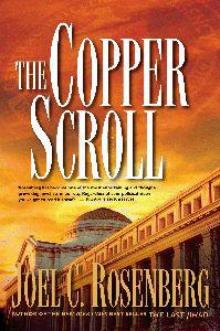 The Copper Scroll
The Copper Scroll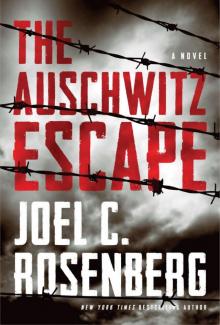 The Auschwitz Escape
The Auschwitz Escape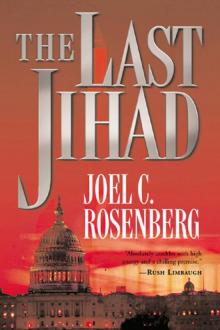 The Last Jihad
The Last Jihad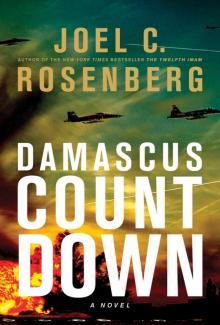 Damascus Countdown
Damascus Countdown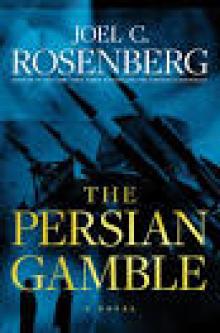 The Persian Gamble
The Persian Gamble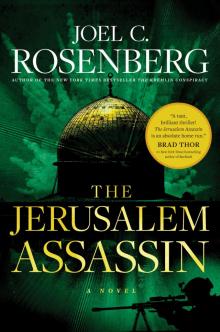 The Jerusalem Assassin
The Jerusalem Assassin Dead Heat
Dead Heat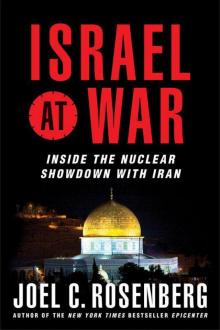 Israel at War: Inside the Nuclear Showdown With Iran
Israel at War: Inside the Nuclear Showdown With Iran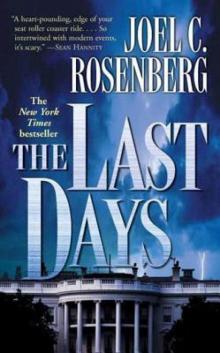 The Last Days
The Last Days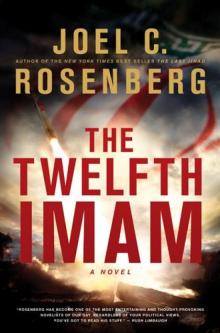 The Twelfth Imam
The Twelfth Imam Epicenter 2.0
Epicenter 2.0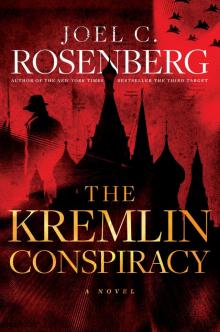 The Kremlin Conspiracy
The Kremlin Conspiracy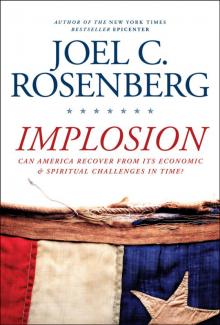 Implosion: Can America Recover From Its Economic and Spiritual Challenges in Time?
Implosion: Can America Recover From Its Economic and Spiritual Challenges in Time?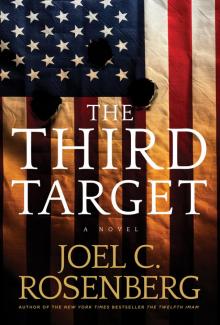 The Third Target: A J. B. Collins Novel
The Third Target: A J. B. Collins Novel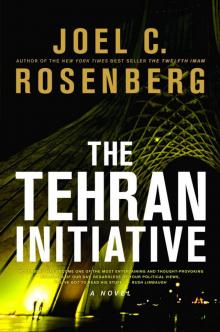 The Tehran Initiative
The Tehran Initiative Inside the Revolution
Inside the Revolution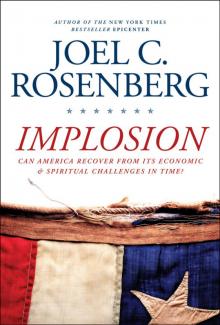 Implosion
Implosion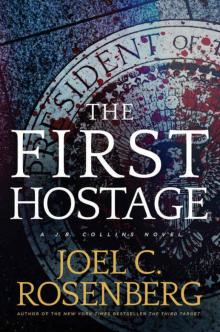 The First Hostage: A J. B. Collins Novel
The First Hostage: A J. B. Collins Novel